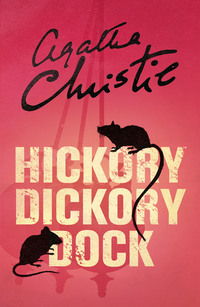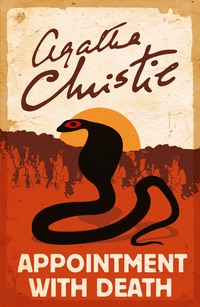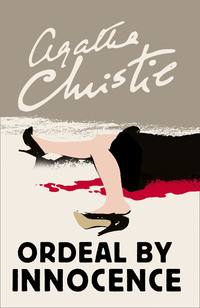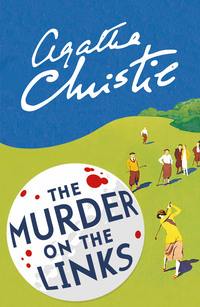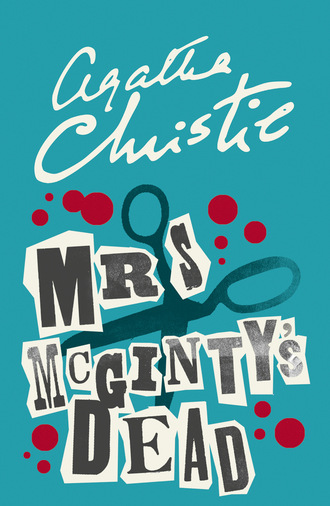
Полная версия
Mrs McGinty’s Dead
Poirot took out one of his cards. On it he wrote Long Meadows and the telephone number.
‘That is where I am staying.’
His name, he noted with chagrin, made no particular impression on her. The younger generation, he could not but feel, were singularly lacking in knowledge of notable celebrities.
III
Hercule Poirot caught a bus back to Broadhinny feeling slightly more cheerful. At any rate there was one person who shared his belief in James Bentley’s innocence. Bentley was not so friendless as he had made himself out to be.
His mind went back again to Bentley in prison. What a dispiriting interview it had been. There had been no hope aroused, hardly a stirring of interest.
‘Thank you,’ Bentley had said dully, ‘but I don’t suppose there is anything anyone can do.’
No, he was sure he had not got any enemies.
‘When people barely notice you’re alive, you’re not likely to have any enemies.’
‘Your mother? Did she have an enemy?’
‘Certainly not. Everyone liked and respected her.’
There was a faint indignation in his tone.
‘What about your friends?’
And James Bentley had said, or rather muttered, ‘I haven’t any friends…’
But that had not been quite true. For Maude Williams was a friend.
‘What a wonderful dispensation it is of Nature’s,’ thought Hercule Poirot, ‘that every man, however superficially unattractive, should be some woman’s choice.’
For all Miss Williams’s sexy appearance, he had a shrewd suspicion that she was really the maternal type.
She had the qualities that James Bentley lacked, the energy, the drive, the refusal to be beaten, the determination to succeed.
He sighed.
What monstrous lies he had told that day! Never mind—they were necessary.
‘For somewhere,’ said Poirot to himself, indulging in an absolute riot of mixed metaphors, ‘there is in the hay a needle, and among the sleeping dogs there is one on whom I shall put my foot, and by shooting the arrows into the air, one will come down and hit a glass-house!’
Chapter 7
I
The cottage where Mrs McGinty had lived was only a few steps from the bus stop. Two children were playing on the doorstep. One was eating a rather wormy-looking apple and the other was shouting and beating on the door with a tin tray. They appeared quite happy. Poirot added to the noise by beating hard on the door himself.
A woman looked round the corner of the house. She had on a coloured overall and her hair was untidy.
‘Stop it, Ernie,’ she said.
‘Sha’n’t,’ said Ernie and continued.
Poirot deserted the doorstep and made for the corner of the house.
‘Can’t do anything with children, can you?’ the woman said.
Poirot thought you could, but forbore to say so.
He was beckoned round to the back door.
‘I keep the front bolted up, sir. Come in, won’t you?’
Poirot passed through a very dirty scullery into an almost more dirty kitchen.
‘She wasn’t killed here,’ said the woman. ‘In the parlour.’
Poirot blinked slightly.
‘That’s what you’re down about, isn’t it? You’re the foreign gentleman from up at Summerhayes?’
‘So you know all about me?’ said Poirot. He beamed. ‘Yes, indeed, Mrs—’
‘Kiddle. My husband’s a plasterer. Moved in four months ago, we did. Been living with Bert’s mother before…Some folks said: “You’d never go into a house where there’s been a murder, surely?”—but what I said was, a house is a house, and better than a back sitting-room and sleeping on two chairs. Awful, this ’ousing shortage, isn’t it? And anyway we’ve never been troubled ’ere. Always say they walk if they’ve been murdered, but she doesn’t! Like to see where it happened?’
Feeling like a tourist being taken on a conducted tour, Poirot assented.
Mrs Kiddle led him into a small room over-burdened with a heavy Jacobean suite. Unlike the rest of the house, it showed no signs of ever having been occupied.
‘Down on the floor she was and the back of her head split open. Didn’t half give Mrs Elliot a turn. She’s the one what found her—she and Larkin who comes from the Co-op with the bread. But the money was took from upstairs. Come along up and I’ll show you where.’
Mrs Kiddle led the way up the staircase and into a bedroom which contained a large chest of drawers, a big brass bed, some chairs, and a fine assembly of baby clothes, wet and dry.
‘Right here it was,’ said Mrs Kiddle proudly.
Poirot looked round him. Hard to visualize that this rampant stronghold of haphazard fecundity was once the well-scrubbed domain of an elderly woman who was house-proud. Here Mrs McGinty had lived and slept.
‘I suppose this isn’t her furniture?’
‘Oh no. Her niece over in Cullavon took away all that.’
There was nothing left here of Mrs McGinty. The Kiddles had come and conquered. Life was stronger than death.
From downstairs the loud fierce wail of a baby arose.
‘That’s the baby woken up,’ said Mrs Kiddle unnecessarily.
She plunged down the stairs and Poirot followed her.
There was nothing here for him.
He went next door.
II
‘Yes, sir, it was me found her.’
Mrs Elliot was dramatic. A neat house, this, neat and prim. The only drama in it was Mrs Elliot’s, a tall gaunt dark-haired woman, recounting her one moment of glorious living.
‘Larkin, the baker, he came and knocked at the door. “It’s Mrs McGinty,” he said, “we can’t make her hear. Seems she might have been taken bad.” And indeed I thought she might. She wasn’t a young woman, not by any means. And palpitations she’d had, to my certain knowledge. I thought she might have had a stroke. So I hurried over, seeing as there were only the two men, and naturally they wouldn’t like to go into the bedroom.’
Poirot accepted this piece of propriety with an assenting murmur.
‘Hurried up the stairs, I did. He was on the landing, pale as death he was. Not that I ever thought at the time—well, of course, then I didn’t know what had happened. I knocked on the door loud and there wasn’t any answer, so I turned the handle and I went in. The whole place messed about—and the board in the floor up. “It’s robbery,” I said. “But where’s the poor soul herself?” And then we thought to look in the sitting-room. And there she was…Down on the floor with her poor head stove in. Murder! I saw at once what it was—murder! Couldn’t be anything else! Robbery and murder! Here in Broadhinny. I screamed and I screamed! Quite a job they had with me. Come over all faint, I did. They had to go and get me brandy from the Three Ducks. And even then I was all of a shiver for hours and hours. “Don’t you take on so, mother,” that’s what the sergeant said to me when he came. “Don’t you take on so. You go home and make yourself a nice cup of tea.” And so I did. And when Elliot came home, “Why, whatever’s happened?” he says, staring at me. Still all of a tremble I was. Always was sensitive from a child.’
Poirot dexterously interrupted this thrilling personal narrative.
‘Yes, yes, one can see that. And when was the last time you had seen poor Mrs McGinty?’
‘Must have been the day before, when she’d stepped out into the back garden to pick a bit of mint. I was just feeding the chickens.’
‘Did she say anything to you?’
‘Just good afternoon and were they laying any better.’
‘And that’s the last time you saw her? You didn’t see her on the day she died?’
‘No. I saw Him though.’ Mrs Elliot lowered her voice. ‘About eleven o’clock in the morning. Just walking along the road. Shuffling his feet the way he always did.’
Poirot waited, but it seemed that there was nothing to add.
He asked:
‘Were you surprised when the police arrested him?’
‘Well, I was and I wasn’t. Mind you, I’d always thought he was a bit daft. And no doubt about it, these daft ones do turn nasty, sometimes. My uncle had a feeble-minded boy, and he could go very nasty sometimes—as he grew up, that was. Didn’t know his strength. Yes, that Bentley was daft all right, and I shouldn’t be surprised if they don’t hang him when it comes to it, but sends him to the asylum instead. Why, look at the place he hid the money. No one would hide money in a place like that unless he wanted it to be found. Just silly and simple like, that’s what he was.’
‘Unless he wanted it found,’ murmured Poirot. ‘You did not, by any chance, miss a chopper—or an axe?’
‘No, sir, I did not. The police asked me that. Asked all of us in the cottages here. It’s a mystery still what he killed her with.’
III
Hercule Poirot walked towards the post office.
The murderer had wanted the money found, but he had not wanted the weapon to be found. For the money would point to James Bentley and the weapon would point to—whom?
He shook his head. He had visited the other two cottages. They had been less exuberant than Mrs Kiddle and less dramatic than Mrs Elliot. They had said in effect that Mrs McGinty was a very respectable woman who kept herself to herself, that she had a niece over at Cullavon, that nobody but the said niece ever came to see her, that nobody, so far as they knew, disliked her or bore a grudge against her, that was it true that there was a petition being got up for James Bentley and would they be asked to sign it?
‘I get nowhere—nowhere,’ said Poirot to himself. ‘There is nothing—no little gleam. I can well understand the despair of Superintendent Spence. But it should be different for me. Superintendent Spence, he is a good and painstaking police officer, but me, I am Hercule Poirot. For me, there should be illumination!’
One of his patent leather shoes slopped into a puddle and he winced.
He was the great, the unique Hercule Poirot, but he was also a very old man and his shoes were tight.
He entered the post office.
The right-hand side was given to the business of His Majesty’s mails. The left-hand side displayed a rich assortment of varied merchandise, comprising sweets, groceries, toys, hardware, stationery, birthday cards, knitting wool and children’s underclothes.
Poirot proceeded to a leisurely purchase of stamps.
The woman who bustled forward to attend to him was middle-aged with sharp, bright eyes.
‘Here,’ said Poirot to himself, ‘is undoubtedly the brains of the village of Broadhinny.’
Her name, not inappropriately, was Mrs Sweetiman.
‘And twelve pennies,’ said Mrs Sweetiman, deftly extracting them from a large book. ‘That’s four and tenpence altogether. Will there be anything more, sir?’
She fixed a bright eager glance at him. Through the door at the back a girl’s head showed listening avidly. She had untidy hair and a cold in the head.
‘I am by way of being a stranger in these parts,’ said Poirot solemnly.
‘That’s right, sir,’ agreed Mrs Sweetiman. ‘Come down from London, haven’t you?’
‘I expect you know my business here as well as I do,’ said Poirot with a slight smile.
‘Oh no, sir, I’ve really no idea,’ said Mrs Sweetiman in a wholly perfunctory manner.
‘Mrs McGinty,’ said Poirot.
Mrs Sweetiman shook her head.
‘That was a sad business—a shocking business.’
‘I expect you knew her well?’
‘Oh I did. As well as anyone in Broadhinny, I should say. She’d always pass the time of day with me when she came in here for any little thing. Yes, it was a terrible tragedy. And not settled yet, or so I’ve heard people say.’
‘There is a doubt—in some quarters—as to James Bentley’s guilt.’
‘Well,’ said Mrs Sweetiman, ‘it wouldn’t be the first time the police got hold of the wrong man—though I wouldn’t say they had in this case. Not that I should have thought it of him really. A shy, awkward sort of fellow, but not dangerous or so you’d think. But there, you never know, do you?’
Poirot hazarded a request for notepaper.
‘Of course, sir. Just come across the other side, will you?’
Mrs Sweetiman bustled round to take her place behind the left-hand counter.
‘What’s difficult to imagine is, who it could have been if it wasn’t Mr Bentley,’ she remarked as she stretched up to a top shelf for notepaper and envelopes. ‘We do get some nasty tramps along here sometimes, and it’s possible one of these might have found a window unfastened and got in that way. But he wouldn’t go leaving the money behind him, would he? Not after doing murder to get it—and pound notes anyway, nothing with numbers or marked. Here you are, sir, that’s a nice blue Bond, and envelopes to match.’
Poirot made his purchase.
‘Mrs McGinty never spoke of being nervous of anyone, or afraid, did she?’ he asked.
‘Not to me, she didn’t. She wasn’t a nervous woman. She’d stay late sometimes at Mr Carpenter’s—that’s Holmeleigh at the top of the hill. They often have people to dinner and stopping with them, and Mrs McGinty would go there in the evening sometimes to help wash up, and she’d come down the hill in the dark, and that’s more than I’d like to do. Very dark it is—coming down that hill.’
‘Do you know her niece at all—Mrs Burch?’
‘I know her just to speak to. She and her husband come over sometimes.’
‘They inherited a little money when Mrs McGinty died.’
The piercing dark eyes looked at him severely.
‘Well, that’s natural enough, isn’t it, sir? You can’t take it with you, and it’s only right your own flesh and blood should get it.’
‘Oh yes, oh yes, I am entirely in agreement. Was Mrs McGinty fond of her niece?’
‘Very fond of her, I think, sir. In a quiet way.’
‘And her niece’s husband?’
An evasive look appeared in Mrs Sweetiman’s face.
‘As far as I know.’
‘When did you see Mrs McGinty last?’
Mrs Sweetiman considered, casting her mind back.
‘Now let me see, when was it, Edna?’ Edna, in the doorway, sniffed unhelpfully. ‘Was it the day she died? No, it was the day before—or the day before that again? Yes, it was a Monday. That’s right. She was killed on the Wednesday. Yes, it was Monday. She came in to buy a bottle of ink.’
‘She wanted a bottle of ink?’
‘Expect she wanted to write a letter,’ said Mrs Sweetiman brightly.
‘That seems probable. And she was quite her usual self, then? She did not seem different in any way?’
‘N-no, I don’t think so.’
The sniffing Edna shuffled through the door into the shop and suddenly joined in the conversation.
‘She was different,’ she asserted. ‘Pleased about something—well—not quite pleased—excited.’
‘Perhaps you’re right,’ said Mrs Sweetiman. ‘Not that I noticed it at the time. But now that you say so—sort of spry, she was.’
‘Do you remember anything she said on that day?’
‘I wouldn’t ordinarily. But what with her being murdered and the police and everything, it makes things stand out. She didn’t say anything about James Bentley, that I’m quite sure. Talked about the Carpenters a bit and Mrs Upward—places where she worked, you know.’
‘Oh yes, I was going to ask you whom exactly she worked for here.’
Mrs Sweetiman replied promptly:
‘Mondays and Thursdays she went to Mrs Summerhayes at Long Meadow. That’s where you are staying, isn’t it?’
‘Yes,’ Poirot sighed, ‘I suppose there is not anywhere else to stay?’
‘Not right in Broadhinny, there isn’t. I suppose you aren’t very comfortable at Long Meadows? Mrs Summerhayes is a nice lady but she doesn’t know the first thing about a house. These ladies don’t who come back from foreign parts. Terrible mess there always was there to clean up, or so Mrs McGinty used to say. Yes, Monday afternoons and Thursday mornings Mrs Summerhayes, then Tuesday mornings Dr Rendell’s and afternoons Mrs Upward at Laburnums. Wednesday was Mrs Wetherby at Hunter’s Close and Friday Mrs Selkirk—Mrs Carpenter she is now. Mrs Upward’s an elderly lady who lives with her son. They’ve got a maid, but she’s getting on, and Mrs McGinty used to go once a week to give things a good turn out. Mr and Mrs Wetherby never seem to keep any help long—she’s rather an invalid. Mr and Mrs Carpenter have a beautiful home and do a lot of entertaining. They’re all very nice people.’
It was with this final pronouncement on the population of Broadhinny that Poirot went out into the street again.
He walked slowly up the hill towards Long Meadows. He hoped devoutly that the contents of the bulged tin and the bloodstained beans had been duly eaten for lunch and had not been saved for a supper treat for him. But possibly there were other doubtful tins. Life at Long Meadows certainly had its dangers.
It had been, on the whole, a disappointing day.
What had he learned?
That James Bentley had a friend. That neither he nor Mrs McGinty had had any enemies. That Mrs McGinty had looked excited two days before her death and had bought a bottle of ink—
Poirot stopped dead…Was that a fact, a tiny fact at last?
He had asked idly, what Mrs McGinty should want with a bottle of ink, and Mrs Sweetiman had replied, quite seriously, that she supposed she wanted to write a letter.
There was significance there—a significance that had nearly escaped him because to him, as to most people, writing a letter was a common everyday occurrence.
But it was not so to Mrs McGinty. Writing a letter was to Mrs McGinty such an uncommon occurrence that she had to go out and buy a bottle of ink if she wanted to do so.
Mrs McGinty, then, hardly ever wrote letters. Mrs Sweetiman, who was the postmistress, was thoroughly cognisant of the fact. But Mrs McGinty had written a letter two days before her death. To whom had she written and why?
It might be quite unimportant. She might have written to her niece—to an absent friend. Absurd to lay such stress on a simple thing like a bottle of ink.
But it was all he had got and he was going to follow it up.
A bottle of ink…
Конец ознакомительного фрагмента.
Текст предоставлен ООО «ЛитРес».
Прочитайте эту книгу целиком, купив полную легальную версию на ЛитРес.
Безопасно оплатить книгу можно банковской картой Visa, MasterCard, Maestro, со счета мобильного телефона, с платежного терминала, в салоне МТС или Связной, через PayPal, WebMoney, Яндекс.Деньги, QIWI Кошелек, бонусными картами или другим удобным Вам способом.





